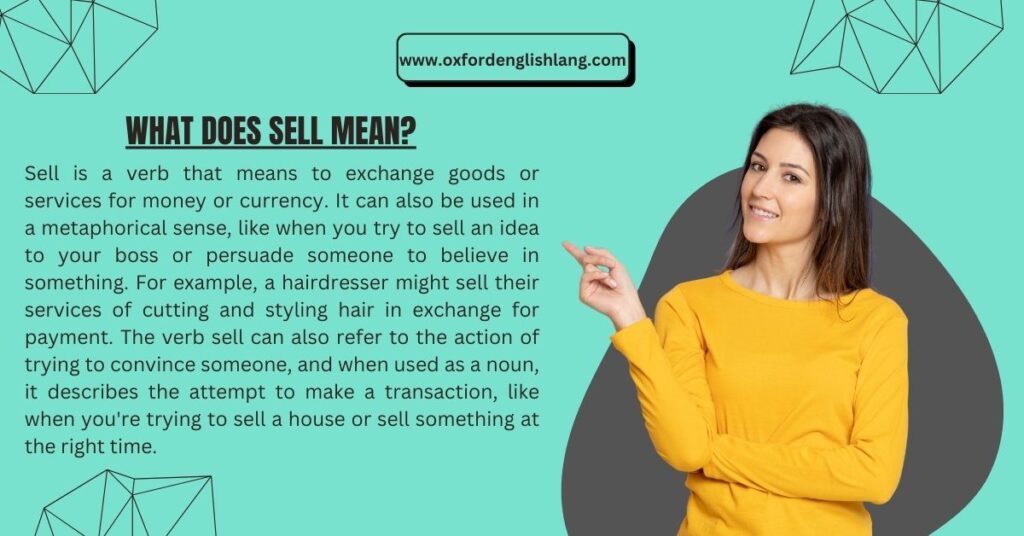When discussing sale and sell, it’s easy to see why confusion frequently arises. These words are not just similar in sound but also overlap in meanings and usage. As a child, I often wondered why my teacher would explain the difference in sentences that seemed almost identical.
She would show how “sell” works as a verb while “sale” is a noun referring to the exchange of goods or property for money. For example, when a store advertises a clearance, they are promoting a “sale,” but when you purchase chocolates on Valentine’s Day, you “sell” yourself on the idea of a must-buy treat.
The key is to pay close attention to the context. For instance, in a quiz, you might be asked to define whether “sale” fits better than “sell” in a sentence. These two are also homophones, which adds to the confusion.
I remember reading an article that covered this topic in English class, where it was called a “one-stop guide.” That helped me learn how to use them correctly, avoiding the oversell of one word over the other. This distinct understanding is essential for learners to look past the spellings and focus on their function in communication.
Sale Vs Sell: Key difference in short
Sale is a noun that refers to the event or act of offering goods or services for sale at a reduced price or through a transaction. On the other hand, sell is a verb used for the action of giving or persuading someone to buy something, often involving an exchange of money or payment. Some phrases like “an easy sell” or “a tough sell” highlight how convincing a purchase can be.
What Does Sale Mean?

When we talk about a sale, we are referring to an event where goods or services are exchanged for money. It can be as simple as a bargain where items are offered at a reduced price or a special time, like a Christmas sale.
For example, when you see “for sale” on a property, it means that the owner is ready to sell it. But when something is “on sale,” it typically refers to a reduced price. The sale might also involve a transaction, such as when you purchase an item at a sale price.
Usage of the term “Sale”
The term sale can also refer to a business event, like a sales department within a company, or a large-scale promotion that includes multiple items. For instance, a company might report sales of $5,000 or even one million dollars in a month.
It’s important to understand the context of the sale because it can vary based on whether the price is reduced or if the item is just available for purchase. A sale can also be a transaction in which goods are exchanged for money, and in some cases, a sale can happen on sale or for sale, depending on the situation.
In simpler terms, the sale is an essential part of the business world. Whether you are looking for discounted prices, bargains, or making a purchase, the term sale is used to describe various transactions.
From a restaurant offering a special sale to a company promoting a sale of their goods, the concept remains the same. So, the next time you see “on sale,” it’s clear that you’re getting a deal at a reduced price.
Examples of “Sale” used in a sentence
- The store is having a sale on all winter clothing this weekend.
- She bought a new sofa at a sale for half the regular price.
- The sale of the old property was finalized last week.
- Everything in the store is on sale, with up to 50% off.
- The company reported a sale of over one million dollars last quarter.
- The sale of the vintage car went through smoothly after the bidding war.
- The sale on electronics ends tomorrow, so hurry up and buy your items.
- The sale was a huge success, with bargains flying off the shelves.
- The house is for sale, and the owner is asking for a fair price.
- I bought the tickets for the concert on sale earlier this week.
You Might also like: Have Fun or Enjoy: The Powerful Difference Revealed
What Does Sell Mean?

Sell is a verb that means to exchange goods or services for money or currency. It can also be used in a metaphorical sense, like when you try to sell an idea to your boss or persuade someone to believe in something. For example, a hairdresser might sell their services of cutting and styling hair in exchange for payment.
The verb sell can also refer to the action of trying to convince someone, and when used as a noun, it describes the attempt to make a transaction, like when you’re trying to sell a house or sell something at the right time.
Meaning and Usage of ‘Sell’ as a Verb
When we talk about sell as a verb, we refer to the action of exchanging goods or services for money. For example, you might sell a motorcycle or house, or even sell a book by using a name on the cover to persuade someone to buy it. It can also mean to make something available for purchase, like selling cookies for a dollar apiece.
Sometimes, sell is used to describe the influence or persuading of others to purchase something, like when stock prices are increasing, encouraging people to sell their assets at the right time. In all these cases, sell can be understood as a way to promote or facilitate a transaction.
Meaning and Usage of ‘Sell’ as a Noun
When sell is used as a noun, it refers to something that is being exchanged or offered for money. For example, a house can be an easy sell or a used car might be a hard sell, depending on its condition. It also describes the person or agent involved in the exchange, such as a purchasing agent who might be a tough sell when convincing someone to buy.
This concept is closely tied to the art of persuading others, often seen in sales or campaigns. A sale can be described as an easy sale when the product or service is in demand, like how the vibrancy of downtown can make an easy sale to investors looking to be part of the city’s growth.
This connection is evident in Wichita Falls‘ entertainment district, where investors recognize the potential of a thriving area, just as Steve Cowper‘s 1986 Democratic primary win was an easy sale due to his strong campaign and the excitement around his win.
Examples of ‘Sell’ used in a sentence
- I need to sell my old bicycle before I move to the new city.
- The car dealership is trying to sell the last few models before the new ones arrive.
- He decided to sell his guitar to raise some money for his trip.
- The company plans to sell its products online to reach a larger audience.
- She was able to sell her artwork at the local gallery last weekend.
- The shop is offering a special discount to sell more shoes this season.
- They will sell their house and move to a bigger property in the suburbs.
- The salesperson tried to sell me an expensive phone, but I wasn’t interested..
- He managed to sell his idea to the investors and secure funding for his startup.
You Might also like: Coach vs. Couch: A Surprising Battle of Terms!
Difference between sale and sell
The main difference between sale and sell lies in their function in a sentence. Sale is always a noun, and it refers to the act of offering goods or services for purchase or a transaction where something is exchanged for money. For example, you might have a sale at a store where items are sold at a lower price.
On the other hand, sell is a verb that describes the action of offering something in exchange for money. You might say, “I want to sell my car” or “The store sells hats.”
In terms of grammar, sale is often used with prepositions like on or for, such as in the phrase “20% off sale.” Sell is typically used to offer something or persuade someone to buy it.
For instance, a seller might sell a million copies of a book or persuade a person to accept a proposal. Understanding these related words and their meanings helps prevent confusion, as they are often mixed up due to their close relationship in the context of transactions and exchange.
For sale or for sell?
The proper expression is “for sale,” not “for sell.” “For sale” means that an item is available for purchase, while “for sell” is a misspelling of the correct phrase.
Conclusion
In conclusion, sale and sell are closely related, understanding their distinct roles in grammar is crucial for clear communication. Sale refers to the noun form, describing the act or event of offering something for purchase, often at a lower price, while sell is the verb that describes the action of offering goods or services in exchange for money. By keeping their meanings and functions in mind, you can avoid confusion and use both terms accurately in your writing and conversations.
You Might also like: Interested In or On? Mystery Solved
FAQs
Is it for sale or on sale?
The correct phrase is “for sale.” This means that an item is available for purchase. On the other hand, “on sale” refers to an item being offered at a discounted price, usually as part of a sale event or promotion.
Are sale and sell interchangeable?
No, “sale” and “sell” are not interchangeable. “Sale” is a noun, referring to the act or event of selling something, while “sell” is a verb, describing the action of offering something in exchange for money. They have different grammatical functions and meanings.
Which Is Correct: “For Sale” or “For Sell”?
The correct expression is “for sale.” This indicates that something is available to be bought. “For sell” is grammatically incorrect and should not be used.
What Is the Difference Between Sale Price and Selling Price?
The “sale price” refers to the price at which an item is sold, often discounted or reduced during a sale event. The “selling price” is the price at which a seller offers an item to a buyer, which may or may not be discounted.
How Do I Know When to Use Sell or Sale?
Use “sell” when referring to the action of offering something in exchange for money, as in “I want to sell my car.” Use “sale” when referring to the event or transaction, as in “The car is for sale.” Remember, “sell” is a verb, and “sale” is a noun.

david Miller is an experienced English language expert with a deep passion for helping others communicate effectively and confidently. With a background in linguistics and literature, He provides clear, accessible insights on grammar, writing, and communication strategies. Through well-researched articles and practical advice, David Miller aims to make language learning both inspiring and achievable for readers of all levels.
